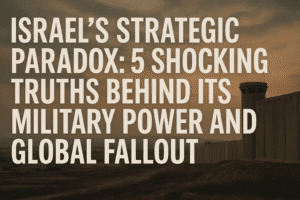Israel’s Strategic Paradox: 5 Shocking Truths Behind Its Military Power and Global Fallout
Israel’s military dominance has delivered unprecedented security, crippling threats from Hamas, Hezbollah, and Iran, fostering hopes for lasting border safety. Yet this victory came at a profound cost: devastating Gaza’s infrastructure and population ignited global outrage, collapsing decades of bipartisan Western support and transforming Israel into a pariah state in much of world opinion. Surging activism like the BDS movement and European recognition of Palestine signal deep diplomatic isolation.
Domestically, prioritizing military action over hostage rescue fractured society, while emboldened West Bank settlers undermine future peace prospects. Internationally, the conflict fueled campus protests, antisemitism, and accusations of war crimes, eroding Israel’s moral standing. The result is a stark paradox: Israelis may feel safer from rockets but face greater hostility abroad and fractured alliances. This hard-won security feels perilously fragile, built on isolation and human suffering that risks radicalizing a new generation, leaving Israel strategically stronger yet profoundly alone.

Israel’s Strategic Paradox: 5 Shocking Truths Behind Its Military Power and Global Fallout
Israel stands at a crossroads unprecedented since 1948. Its military has degraded Hamas, crippled Hezbollah, and struck Iran’s nuclear capabilities—achieving tactical dominance once deemed impossible. Yet this hard-won security has come with profound consequences, fracturing its international relationships and igniting ethical debates that redefine its place among democracies.
The Security Mirage
- Tactical Triumphs: Neutralizing threats from Gaza to Tehran has created Israel’s most secure borders in generations. Retired General Yaakov Amidror boldly claims areas like Lebanon-border towns may soon be “safer than Manhattan.”
- Strategic Shifts: Stable ties with Gulf Arab states (despite tensions) and a fortified Trump-Netanyahu alliance offer diplomatic insulation.
- The Domestic Divide: While many Israelis welcome reduced existential threats, others lament the human toll—soldiers lost, hostages abandoned (20 remain captive after 631 days), and a society grappling with trauma.
The Isolation Equation
Global Backlash
- Public opinion has cratered: Over 75% view Israel negatively in 8+ nations (Pew Research). Once-tolerated operations now face genocide accusations.
- The BDS movement tripled in size (e.g., UK’s Palestine Solidarity Campaign), pushing brands like Co-op to boycott Israeli goods.
- Symbolic blows: European recognition of Palestine (Spain, Norway, Ireland) signals eroded diplomatic goodwill.
The American Rift
- U.S. bipartisan support collapsed: Only 46% of Americans now back Israel (lowest in 25 years). Campus protests and antisemitic violence reveal deepening societal fractures.
- Political weaponization: Criticizing Israel risks accusations of antisemitism; defending it invites charges of ignoring Palestinian suffering.
Human Costs as Geopolitical Liabilities
- Gaza’s devastation—1+ million homeless, tens of thousands dead—fuels global outrage. “You can’t bomb your way to legitimacy,” notes a London protester.
- Hostage families voice anguish: “The hostages are paying the price for Netanyahu’s wars,” says Nira Sharabi, whose husband died in captivity.
- Settler violence in the West Bank undermines claims of moral restraint, alienating potential Arab partners.
The Vicious Cycle of Force
- Short-Term Security, Long-Term Risk: Each strike radicalizes a new generation of Palestinians. As Lior Soharin, an Israeli reservist, admits: “Our sense of safety was shattered on Oct 7—it won’t return with bombs.”
- Diplomatic Paralysis: Saudi normalization is frozen; European allies scold Israel publicly. Military dominance hasn’t translated to political solutions.
- The Identity Toll: Israelis abroad hide their language; Jews globally face violence blamed on Israel’s actions. Victory breeds vulnerability.
The Unanswerable Question
Netanyahu’s strategy echoes Menachem Begin’s 1981 decree: “Never wonder what the world will say.” Yet in 2025, the world’s response is undeniable. Israel secured its borders but lost its narrative—viewed less as a besieged democracy and more as an unchecked aggressor.
The core dilemma remains: Can tactical wins create lasting peace when they deepen isolation and human suffering? As one Tel Aviv student puts it: “We’re safer from rockets, but more alone than ever.” In trading immediate threats for long-term alienation, Israel’s victory feels pyrrhic—a fortress built on sand.
You must be logged in to post a comment.